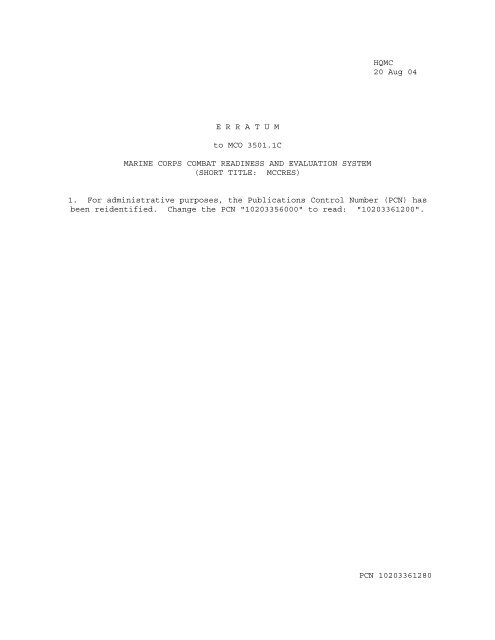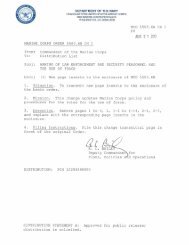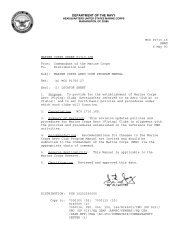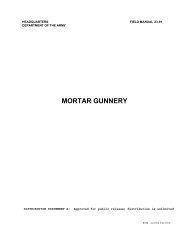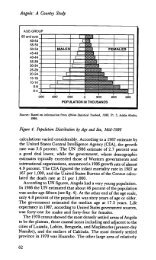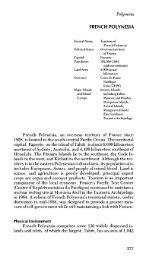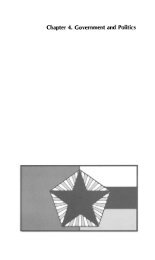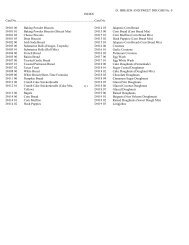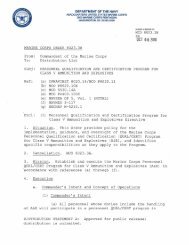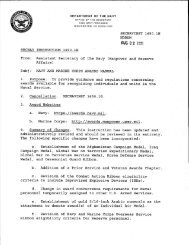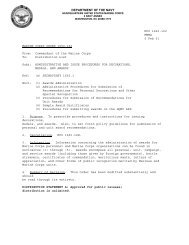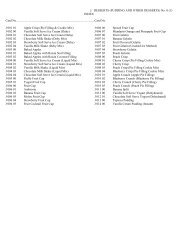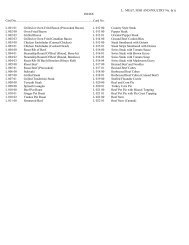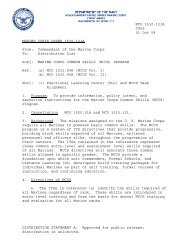MCO 3501.1C W ERRATUM.pdf - Marine Corps
MCO 3501.1C W ERRATUM.pdf - Marine Corps
MCO 3501.1C W ERRATUM.pdf - Marine Corps
Create successful ePaper yourself
Turn your PDF publications into a flip-book with our unique Google optimized e-Paper software.
E R R A T U M<br />
to <strong>MCO</strong> <strong>3501.1C</strong><br />
MARINE CORPS COMBAT READINESS AND EVALUATION SYSTEM<br />
(SHORT TITLE: MCCRES)<br />
HQMC<br />
20 Aug 04<br />
1. For administrative purposes, the Publications Control Number (PCN) has<br />
been reidentified. Change the PCN "10203356000" to read: "10203361200".<br />
PCN 10203361280
MARINE CORPS ORDER <strong>3501.1C</strong><br />
From: Commandant of the <strong>Marine</strong> <strong>Corps</strong><br />
To: Distribution List<br />
<strong>MCO</strong> <strong>3501.1C</strong><br />
C 461<br />
30 MAR 93<br />
Subj: MARINE CORPS COMBAT READINESS AND EVALUATION SYSTEM<br />
(SHORT TITLE: MCCRES)<br />
Ref: (a) <strong>MCO</strong> 1553.3<br />
(b) <strong>MCO</strong> 1553.5<br />
DEPARTMENT OF THE NAVY<br />
HEADQUARTERS UNITED STATES MARINE CORPS<br />
WASHINGTON, DC 20380-0001<br />
Encl: (1) MCCRES Mission Performance Standards (MPS’s)<br />
(2) Index of MCCRES Volumes<br />
(3) Conducting a MCCRES<br />
(4) Evaluation Performance Standards (EPS’s)<br />
(5) MCCRES Reporting System<br />
(6) Software Change Proposal (SCP)<br />
1. Purpose. To provide the <strong>Marine</strong> <strong>Corps</strong> with an evaluation<br />
system based on Mission Performance Standards (MPS’s). These<br />
standards are developed using the Systems Approach to Training<br />
(SAT) for the purpose of assisting commanders in developing the<br />
Mission Essential Task List (METL) that satisfy combat<br />
requirements. The MCCRES provides Fleet <strong>Marine</strong> Force<br />
commanders with a comprehensive set of Mission Performance<br />
Standards (MPS’s) from which training programs are developed,<br />
implemented, and evaluated for effectiveness and efficiency per<br />
reference (a).<br />
2. Cancellation. <strong>MCO</strong> 3501.1B.<br />
3. Background. In March 1976, MCCRES was developed to provide<br />
timely and accurate determination of the combat readiness of<br />
FMF units. In January 1985, the Deputy Chief of Staff for<br />
Training, HQMC (Code T) was given the responsibility for<br />
establishing training standards for mission performance,<br />
identification of deficiencies, and formulating training plans<br />
to increase combat readiness. In May 1988, the Commanding<br />
General, <strong>Marine</strong> <strong>Corps</strong> Combat Development Command (MCCDC)<br />
assumed the responsibilities for maintaining the MCCRES. MCCRES<br />
was incorporated as a part of the Unit Training Management<br />
program to further assist FMF commanders to meet established<br />
training standards. Formal MCCRES evaluations provide CMC with a<br />
readiness assessment of a unit’s ability to perform the tasks<br />
contained within its METL.
<strong>MCO</strong> <strong>3501.1C</strong><br />
30 MAR 93<br />
4. Information<br />
a. MCCRES Overview. MCCRES standards are published as<br />
<strong>Marine</strong> <strong>Corps</strong> Orders (12 volumes) in the 3501 series. In addition<br />
to the instructions contained in this Order, each volume contains<br />
instructions designed to assist commanders in the development<br />
and evaluation of their training efforts. Specific evaluation<br />
criteria may be found in the introduction section of each<br />
MCCRES volume. As new missions and their essential tasks<br />
(METL’s) are identified and/or new units established through<br />
the combat development process, new volumes will be added to<br />
the current series. MCCRES is a system comprised of four<br />
interdependent yet distinct components. A brief description<br />
of each MCCRES component is provided as follows:<br />
(1) Mission Performance Standards (MPS’s). MPS’s are<br />
mission-oriented collective training standards that establish<br />
minimum acceptable operational performance criteria for FMF<br />
units and elements. MPS’s are organized into separate volumes<br />
by unit type. Enclosure (1) provides additional details on the<br />
formulation of MPS’s.<br />
(2) Mission Performance Evaluation System. The<br />
primary purpose of the MCCRES system is to provide training<br />
feedback both up and down the chain of command. Local<br />
commanders can use training feedback developed through<br />
exercise debriefings and MCCRES reports to identify training<br />
deficiencies, to assess the effectiveness of their training<br />
programs, and to revise training programs to increase combat<br />
proficiency. Properly used by commanders, the MCCRES becomes a<br />
tool for evaluating the training readiness of a unit and the<br />
formulation of future training requirements. With continual<br />
use, training becomes progressive rather than cyclic. To<br />
ensure combat readiness training is progressive, "MCCRES<br />
grades" should not be overemphasized. The MCCRES program can<br />
be used for all field exercises. Commanders are able to use<br />
all or part of one or more volumes to continually evaluate the<br />
unit’s readiness capabilities. Enclosure (2) outlines a<br />
recommended set of procedures for conducting a formal MCCRES,<br />
and enclosure (3) contains standards for exercises in<br />
general.<br />
(3) Reporting system. The format for this report is<br />
the same for all units and is designed to standardize the input<br />
and feedback from all MCCRES exercises. Submission of the<br />
MCCRES report via the chain of command on floppy diskette with<br />
a cover sheet and hard copy in the format provided in enclosure<br />
(4) allows CG MCCDC (C 461) to: (a) Conduct trend analysis on<br />
manning, equipment, and formal training, (b) Revise and update<br />
MPS’s, and (c) Provide CMC with a readiness assessment of all<br />
units.<br />
2
(4) MCCRES Software Program. The MCCRES software has<br />
been designed to provide an efficient training management tool<br />
for accurately assessing the unit’s ability to perform the tasks<br />
contained with its METL(s). Identifiable trends are analyzed<br />
for future updates in equipment, manning, and formal training.<br />
This management tool also provides the capability to create,<br />
record and store exercise worksheets, and to generate training<br />
analysis reports for the commander’s use. This program can be<br />
utilized on the end user computer (Zenith 248 equivalent).<br />
(a) Individual MCCRES volumes can be used in<br />
total or in selected parts during unit training. Input and<br />
comments from the field help keep MPS’s and the MCCRES software<br />
program from becoming outdated or obsolete.<br />
(b) Seminars conducted by Training & Education<br />
(T&E) Division can be requested anytime. Periodic bulletins<br />
are published announcing MCCRES software seminars at major<br />
subordinate commands. A meaningful exchange of ideas, based<br />
on the MCCRES software program and the standards is the key to<br />
keeping the MCCRES current as a diagnostic/training management<br />
tool.<br />
b. MCCRES Volume Review/Revision Conferences<br />
(1) Purpose. MCCRES standards are predicated on<br />
doctrine, equipment, and force structure necessary to support<br />
mission accomplishment. In order to ensure that MCCRES<br />
standards reflect evolving missions and equipment/force<br />
structure changes, MCCRES volume review/revision conferences<br />
shall be convened: (a) when requested by CG MCCDC (C 46), CG’s<br />
MARFORLANT, MARFORPAC, or MARRESFOR, (b) when recommended by an<br />
occupational field, or (c) at a minimum of every three years.<br />
Conference attendees shall include representatives from<br />
Training & Education Division, the formal schools, when<br />
appropriate, subject matter experts (SME’s) from the FMF, and<br />
Manpower and Reserve Affairs Department, Headquarters <strong>Marine</strong><br />
<strong>Corps</strong>. Review of aviation volumes will normally be held in<br />
conjunction with their respective Training and Readiness Manual<br />
Review Conferences. In both cases, members of the volume<br />
specific review conference will complete the following:<br />
(a) Examine MPS’s for changes.<br />
(b) Evaluate the MPS’s for accuracy and<br />
effectiveness.<br />
volumes.<br />
(c) Propose standard changes and/or revisions to<br />
(d) Coordinate MPS requirements with other<br />
communities, as required.<br />
3<br />
<strong>MCO</strong> <strong>3501.1C</strong><br />
30 MAR 93
<strong>MCO</strong> <strong>3501.1C</strong><br />
30 MAR 93<br />
(2) Conference Convening Procedures. CG MCCDC (C 461)<br />
will send a conference announcement message, confirming the<br />
date and location, to the appropriate commands no later than 60<br />
days prior to the actual convening date.<br />
(3) Correspondence. Commands will provide conference<br />
agenda items and the names of attendees, via their appropriate<br />
chain of command, to the CG MCCDC (C 461) no later than 30<br />
days prior to the conference convening date.<br />
(4) Conference Reports. CG MCCDC (C461) will send a<br />
draft of the proposed standard changes to appropriate commands<br />
and other HQMC staff agencies within 30 days of the closing<br />
date of the conference. Conference results will be<br />
incorporated into applicable volumes based on the staffing<br />
results of the proposed change(s).<br />
5. Action<br />
a. Commanding Generals of COMMARFORLANT, COMMARFORPAC, and<br />
MARRESFOR will:<br />
(1) Train units to meet the requirements of their<br />
METL(s) using tasks/standards published within MCCRES.<br />
(2) Use published MCCRES standards (MCCRES Volumes 2<br />
to 12) as a basis for MCCRES training and evaluation. Provide<br />
CG MCCDC (C 461) with all scores from major CPX’s and MCCRES<br />
exercises no later than 30 days after exercise completion.<br />
Scores will be used to build the community files for trend<br />
analysis and lessons learned for release to like units.<br />
(3) Biennially evaluate unit readiness capabilities<br />
(combat, combat support, and combat service support) for which<br />
MPS’s have been developed/published. The CG, <strong>Marine</strong> Reserve<br />
Forces will formally evaluate unit readiness triennially.<br />
(4) Provide knowledgeable representation to the MCCRES<br />
conferences to ensure standards are updated, and/or provide<br />
input when any standards require amplification, clarification,<br />
or change.<br />
(5) Submit requests for updates or deletions of any<br />
Mission Performance Standard(s) in the MCCRES volumes via: (a)<br />
cover letters accompanying the MCCRES exercise report, (b)<br />
Training Feedback Forms found in reference (b), or (c) close<br />
coordination with the CG MCCDC (C 461). This will ensure that<br />
MPS’s contained in MCCRES volumes remain compatible with the<br />
concepts, tactics, and techniques currently used by operational<br />
forces.<br />
(6) Submit Software Change Proposals (SCP) to CG MCCDC<br />
(C 461M) using figure 6-1 in enclosure (6). These proposals<br />
4
allow CG, MCCDC (C 461) to revise the training feedback reports<br />
to ensure they satisfy the needs of the unit commanders.<br />
(7) Submit a list biannually, of units to be evaluated<br />
to CG MCCDC (C 461). This list should consist of all units who<br />
are required to be evaluated during the upcoming two year<br />
period and should be evaluated during the upcoming two year<br />
period and should include the fiscal year quarter in which the<br />
MCCRES will take place. This will ensure an accurate database<br />
with which to conduct trend analysis.<br />
b. Commanding General, MCCDC (C 46) shall:<br />
(1) Using the combat development process, maintain the<br />
MCCRES system to include revisions and development of MPS’s.<br />
(2) Ensure instruction on the use and application of<br />
the MCCRES is provided at the appropriate level of professional<br />
military education (PME) schools for Staff-noncommissioned<br />
Officers and Officers as a component of Training Management<br />
Instruction.<br />
(3) Provide the overall functional management of the<br />
MCCRES Software Program through review and validation of<br />
Software Change Proposals (SCP) for implementation of software<br />
enhancements/maintenance requirements for the FMF.<br />
(4) Provide technical program management/expertise of<br />
the MCCRES software.<br />
(5) Coordinate with AC/S C4I, HQMC, and FMF information<br />
systems management officers on issues pertaining to software<br />
enhancements, maintenance, and technical specifications.<br />
(6) Hold MCCRES Review Conferences per par 4.b.(1) of<br />
this order.<br />
(7) Maintain a database of all MCCRES reports which<br />
can be accessed by commanders for their use. Trend analysis<br />
will be conducted using the MCCRES database. A report of<br />
findings will be provided to Force Commanders highlighting<br />
areas of deficiency that can be corrected with modifications to<br />
local training programs.<br />
6. All recipients of this Order shall ensure ready availability<br />
of MCCRES MPS’s to all <strong>Marine</strong>s who are responsible for the<br />
management/execution of collective training and the subsequent<br />
evaluation of that training. There are three essential aspects<br />
associated with the effective use of the MCCRES system as a unit<br />
training management tool. First, MPS’s in the MCCRES series of<br />
volumes must accurately reflect contemporary missions and their<br />
essential tasks to meet the <strong>Marine</strong> <strong>Corps</strong> minimum accepted<br />
5<br />
<strong>MCO</strong> <strong>3501.1C</strong><br />
30 MAR 93
<strong>MCO</strong> <strong>3501.1C</strong><br />
30 MAR 93<br />
standards of performance. Second, evaluators must be properly<br />
qualified and submit objective observations of the exercise.<br />
Finally, the validity of the information contained in the<br />
MCCRES exercise is dependent on the effectiveness and<br />
uniformity of the exercise techniques employed.<br />
7. Recommendations. Recommendations for MCCRES improvement<br />
and changes will be submitted to the Commanding General, <strong>Marine</strong><br />
<strong>Corps</strong> Combat Development Command, Standards Branch (C 461M),<br />
Training and Education Division, 2008 Elliot Road Suite 119,<br />
Quantico, VA 22134-5029 via enclosure (6) or reference (b).<br />
8. Reserve Applicability. This Order is applicable to the<br />
<strong>Marine</strong> <strong>Corps</strong> Reserve.<br />
DISTRIBUTION: PCN 10203361200<br />
Copy to: 7000110 (55)<br />
7230024 (20)<br />
8145005 (2)<br />
7000099, 144/8145001 (1)<br />
6
MCCRES MISSION PERFORMANCE STANDARDS (MPS’s)<br />
1. GENERAL. MCCRES is structured around a set of performance<br />
standards that establish acceptable operational performance<br />
levels, encompass all mission areas that a particular type of<br />
unit may be called upon to perform in combat, and equally<br />
applicable to <strong>Marine</strong> <strong>Corps</strong> units throughout the world developed<br />
from threat and mission analysis and not training resources<br />
dependent. Mission Performance Standards must:<br />
a. Reflect wartime missions and those tasks that must be<br />
successfully performed to reasonably assure success on the<br />
modern battlefield.<br />
b. Correspond to published doctrine, if available (i.e.,<br />
FMFM’s and aviation tactical manuals), or to accepted<br />
operational tasks/procedures.<br />
c. Be objective/measurable - neither subjective impressions<br />
nor personal opinions are acceptable.<br />
d. Define for the trainer/evaluator, the performance<br />
criteria (quality of performance) that is desired.<br />
e. Be simple to use.<br />
2. MPS COMPONENTS<br />
a. An MPS defines the performance criteria for successful<br />
accomplishment of a specific mission for each type of <strong>Marine</strong><br />
<strong>Corps</strong> unit. Each MPS is composed of five major parts which<br />
include:<br />
(1) Tasks. Each MPS will consist of two or more tasks<br />
that describe criteria that must be performed to successfully<br />
accomplish the MPS.<br />
(2) Conditions. Provides a description of the<br />
environment under which each task is to be performed.<br />
(3) Standards. A detailed description of the<br />
performance criteria which must be accomplished for each task<br />
to be successfully completed.<br />
(4) Evaluator Instructions. Administrative<br />
instructions to aid in the evaluation of tasks.<br />
(5) Key Indicators. Detailed explanation or<br />
amplification of performance criteria provided to assist the<br />
trainer/evaluator.<br />
b. MPS NOMENCLATURE. The elements of an MPS are organized<br />
into a five-level "tree" structure. In the MCCRES tree<br />
structure, each level is assigned a name. Also, each branch<br />
point that corresponds to a specific volume, section, MPS task<br />
or standard is assigned a Data Identification Number (DIN) that<br />
uniquely identifies it and its position in the tree structure.<br />
The level 1 DIN are simply the volume numbers and at levels 2<br />
through 5, letters and numbers are utilized to indicate the<br />
section, MPS, task or standard. The level names and associated<br />
DIN formats are as follows:<br />
Level Level Name Format Example<br />
1 Volume one or two digit numeric 2_._._._<br />
2 Section one character alphabetic 2A._._._<br />
3 MPS one or two digit numeric 2A.3._._<br />
4 Task one or two digit numeric 2A.3.3._<br />
5 Standard one or two digit numeric 2A.3.3.6<br />
1 ENCLOSURE (1)<br />
<strong>MCO</strong> <strong>3501.1C</strong><br />
30 MAR 93
<strong>MCO</strong> <strong>3501.1C</strong><br />
30 MAR 93<br />
PURPOSELY BLANK
INDEX OF MCCRES VOLUMES<br />
1. MCCRES standards are currently organized into a series of<br />
12 volumes published as <strong>Marine</strong> <strong>Corps</strong> orders. Additional<br />
instructions along with specific evaluations criteria may be<br />
found in the introduction section of each MCCRES volume to<br />
assist commanders in both training and formal evaluations. As<br />
new missions are identified and/or new units established, new<br />
volumes will be added.<br />
a. <strong>MCO</strong> <strong>3501.1C</strong><br />
<strong>Marine</strong> <strong>Corps</strong> Combat Readiness Evaluation System, (Short<br />
Title: MCCRES)<br />
b. <strong>MCO</strong> 3501.3A w/Change 1<br />
MCCRES, MPS, Vol II, Infantry Units<br />
PCN 102-033531-01 NAVMC 2879<br />
c. <strong>MCO</strong> 3501.4A<br />
MCCRES, MPS, Vol III, Rotary-Wing and Observation<br />
Squadrons<br />
PCN 102-033532-00 NAVMC 2880<br />
d. <strong>MCO</strong> 3501.5 w/Changes 1, 2, 3, 4, 5, 6, 7<br />
MCCRES, MPS, Vol IV, Fixed-Wind Squadrons<br />
PCN 102-033536-00 NAVMC 2881<br />
e. <strong>MCO</strong> 3501.6B<br />
MCCRES, MPS, Vol V, Artillery Units<br />
PCN 102-033533-00 NAVMC 2882<br />
f. <strong>MCO</strong> 3501.7A<br />
MCCRES, MPS, Vol VI, Combat Service Support Elements<br />
PCN 102-033534-00 NAVMC 2883<br />
g. <strong>MCO</strong> 3501.8A<br />
MCCRES, MPS, Vol VII, <strong>Marine</strong> Air/Ground Task Forces<br />
PCN 102-033535-00 NAVMC 2884<br />
h. <strong>MCO</strong> 3501.9B<br />
MCCRES, MPS, Vol VIII, <strong>Marine</strong> Air Command and Control<br />
Systems<br />
PCN 102-033537-05 NAVMC 2885<br />
i. <strong>MCO</strong> 3501.10 w/Changes 1, 2<br />
MCCRES, MPS, Vol IX, Special Operations<br />
PCN 102-033538-01 NAVMC 2886<br />
j. <strong>MCO</strong> 3501.11 w/Change 1<br />
MCCRES, MPS, Vol X, Combat Vehicles<br />
PCN 102-033539-01 NAVMC 2887<br />
k. <strong>MCO</strong> 3501.12 w/Change 1<br />
MCCRES, MPS, Vol XI, Combat Support Elements<br />
PCN 102-033540-00 NAVMC 2888<br />
l. <strong>MCO</strong> 3501.13<br />
MCCRES, MPS, Vol XII, <strong>Marine</strong> Security Force Battalion<br />
PCN 102-033541-00 NAVMC 2889<br />
2. Units involved in special operations (i.e., SOCEX) may use<br />
these training exercise evaluations to count as a MCCRES where<br />
MPS’s are redundant. Those essential tasks not covered in the<br />
SOCEX must be evaluated separately within an appropriate amount<br />
of time to be determined by higher-headquarters.<br />
1<br />
ENCLOSURE (2)<br />
<strong>MCO</strong> <strong>3501.1C</strong><br />
30 MAR 93
<strong>MCO</strong> <strong>3501.1C</strong><br />
30 MAR 93<br />
CONDUCTING A MCCRES<br />
1. GENERAL. The recommended procedures below primarily discuss a formal exercise, but a small unit leader (platoon<br />
commander) could use a portion of a volume to check the current training level of his personnel. With the<br />
information he could revise or make current training plans for the immediate future. In that case the formal<br />
structure (EC, ED TECG, etc.) would not be used.<br />
2. THE EVALUATION STRUCTURE. Illustrated below are the functions and responsibilities of key commands<br />
and staffs charged with implementing MCCRES exercises.<br />
EXERCISE COMMANDER (EC)<br />
(CG’s, FMFPac/FMFlant)<br />
(CG MARRESFOR)<br />
EXERCISE DIRECTOR (ED)<br />
(Division/Wing/Brigade CG’s)<br />
(As designated by CG MARRESFOR)<br />
TACTICAL EXERCISE COMMANDER (TEC)<br />
(Senior Member of TECG staff)<br />
TACTICAL EXERCISE CONTROL GROUP (TECG)<br />
(Regimental/Group Commanders)<br />
EVALUATORS<br />
3. EXERCISE COMMANDER (EC). The Commanding Generals, FMFPac, FMFLant, MARRESFOR are responsible for the initiation<br />
and conduct of formal MCCRES exercises. Responsibilities and functions of the EC include:<br />
a. Designating the unit(s) to be evaluated based on the guidance provided in this section and enclosure (4)<br />
and providing exercise schedules/updates to HQMC and Trng and Ed Div (C 461M).<br />
b. Designating the exercise director (ED).<br />
c. Prescribing, when appropriate, exercise objectives and desired scenario events.<br />
d. Coordinating with commands or agencies external to the <strong>Marine</strong> <strong>Corps</strong> and adjacent <strong>Marine</strong> <strong>Corps</strong> commands<br />
when required.<br />
e. Reviewing the MCCRES report prepared by the ED and forwarding it to the Director, Training and Education<br />
Division, C 461M.<br />
f. Employing quality control over MCCRES, to ensure that the exercises of subordinate units are reported per<br />
this Order and the eleven separate individual MCCRES volumes.<br />
g. Effecting corrective action, remedy and reporting deficiencies identified during the exercise that are<br />
beyond the subordinate commander’s capability to resolve.<br />
4. EXERCISE DIRECTOR (ED). The ED is designated by the EC to prepare for, conduct, and report all MCCRES<br />
exercises. Commanding General, <strong>Marine</strong> Reserve Forces may designate the ED from a major subordinate command or<br />
headquarters detachment. Responsibilities and functions of the ED include:<br />
a. Publishing a letter of instruction (LOI) delineating the MPS’s to be exercised, timeframe of the exercise,<br />
responsibilities of various elements participating in the exercise, and coordinating instructions. A copy of the<br />
exercise LOI will be provided to the EC prior to the MCCRES exercise date.<br />
b. Designating the tactical exercise controller (TEC) and the tactical exercise control group (TECG) to<br />
operate as the central control agency for the exercise.<br />
c. Assigning evaluators, to include the senior evaluator, and ensuring that an evaluator school is planned<br />
for and conducted.<br />
d. Prescribing the general exercise scenario, taking into account any objectives/scenario events prescribed<br />
by the EC.<br />
1<br />
ENCLOSURE (3)
<strong>MCO</strong> <strong>3501.1C</strong><br />
30 MAR 93<br />
e. Ensuring that the evaluated scenario reflects the evaluated unit commander’s training program goals and<br />
objectives.<br />
f. Arranging for training areas, airspace, aggressor forces, and other required support.<br />
g. Supervising the exercise as required, compiling and analyzing the data, and submitting the MCCRES report to<br />
the EC.<br />
5. TEC. The TEC is appointed by and from the ED’s staff or a subordinate command. The TEC is the senior member of<br />
the TECG and should be senior to the commander(s) of the unit(s) being evaluated. The TEC is responsible to the ED<br />
for ensuring that formal MCCRES exercises are conducted following the instructions contained in this Order, the<br />
specific MCCRES volume is used as the evaluation source, and any other directions prescribed by the ED.<br />
6. TECG. Depending on the frequency of exercises, the ED may find it beneficial to assign a nucleus TECG on a<br />
permanent basis and manage it through the ED’s staff. This action would provide continuity during exercises (EPS<br />
quality control) and the resident expertise on matters pertaining to MCCRES exercises. The responsibilities and<br />
functions of the TECG include:<br />
a. Developing a detailed exercise scenario to include objectives and events prescribed by the EC/ED and LOI.<br />
b. Conducting extensive/detailed evaluator training (evaluator school) per paragraph 7 of this Order.<br />
c. Coordinating and controlling actor/agent input and aggressor response to unit action or inaction in<br />
support of the exercise scenario.<br />
d. Compiling and analyzing data submitted by individual evaluators, and submitting required evaluation<br />
information to the ED.<br />
e. Preparing and conducting a detailed exercise debrief for the exercised unit.<br />
7. EVALUATORS. During formal MCCRES exercises, individual evaluators must be prepared to perform the following<br />
functions:<br />
a. Exercise Controllers. Ensuring the exercise proceeds as planned following the exercise schedule and<br />
scenario. The evaluators insert prescribed events to control and maintain the flow of the exercise, based on the<br />
exercise scenario, and insert events to stimulate specific actions/reactions that will ensure that the exercised<br />
unit is evaluated against all designated MPS’s. They increase or decrease the tempo of operations and maneuver<br />
rates through the use of aggressor maneuver/actions, by inserting actors/agents and by passing intelligence input to<br />
the unit to cause it to alter plans. They provide necessary information from the scene of action by voice, radio and<br />
by the TWSEAS Data Message Entry Device (DMED), when applicable.<br />
b. Umpires. Resolve any disagreement between the exercise force and aggressor forces. They make a<br />
determination of, and assesses, casualties by analyzing the relative combat power of the forces involved through<br />
their own judgment and experience or by utilizing external assets (TACTS/ACMI; TWSEAS combat power ratio factors,<br />
etc.).<br />
c. Performance Evaluators. Applying the prescribed standards to the unit’s performance in the field under<br />
simulated combat conditions and denoting the level of performance achieved. Evaluators must possess a complete and<br />
thorough understanding of the MPS’s that are undertaken in the exercise. The evaluator must review in detail the<br />
individual tasks and standards of the MPS’s he is responsible for evaluating and must be aware of when and where in<br />
the scenario these MPS and tasks are to be evaluated. They must then determine whether the activity or performance<br />
observed fulfills the performance criteria as stated in the standard. When this determination is made, evaluators<br />
simply indicate on the MCCRES exercise worksheet with supporting notes "YES," the standard was met, "NO," the<br />
standard was not met, or "NA," the standard was not applicable. At the same time the evaluators are observing what<br />
is happening, they must also be alert to scheduled events that do not occur, tasks and standards not attempted, and<br />
the reasons why. In assigning "YES" or "NO" or "NA" marks, evaluators must be closely attuned to the tactical play<br />
of the exercise and scheduled scenario events. All "NO" marks will require an explanation in the MCCRES report to<br />
highlight later corrective action. Evaluator remarks must be geared toward assisting the unit in building training<br />
programs in the future. Some "NA" marks will require explanation when it was originally anticipated that those<br />
areas would be accomplished.<br />
ENCLOSURE (3)<br />
2
<strong>MCO</strong> <strong>3501.1C</strong><br />
30 MAR 93<br />
(1) Evaluator Quality. To properly accomplish these important roles, individuals selected as evaluators must have<br />
credibility and be thoroughly prepared to evaluate performance standards. All echelons of the MCCRES exercise<br />
structure must make every effort to assign only the most qualified <strong>Marine</strong>s available to be evaluators for MCCRES<br />
exercises. After identification and selection of the most qualified <strong>Marine</strong>s available, a training program<br />
(evaluator school) must be provided to ensure a complete understanding of evaluator functions.<br />
(2) Evaluator School. Participants at evaluators’ school will include all evaluators, the ED’s representative, the<br />
TEC or appropriate representative, key TECG staff members, officer in charge of the aggressor force, and<br />
representatives from all subelements participating in the evaluation and/or the tactical exercise. Listed below are<br />
those key items which should be covered:<br />
(a) Brief/verification of exercise support requirements as stated in the ED’s LOI.<br />
(b) Specific assignment of evaluators to units/subelements as required.<br />
(c) Detailed brief of exercise scenario to include all major TECG driven events.<br />
(d) Detailed brief of planned aggressor force actions.<br />
(e) Detailed brief of MPS’s to be evaluated and how they relate to the exercise scenario, TECG (higher<br />
headquarters input), and aggressor actions.<br />
(f) Specific evaluator responsibilities with regard to subparagraph 7b(5) above.<br />
(g) EC, TEC, and senior evaluator instructions/ guidance as required.<br />
(h) Brief on the three roles that all evaluators must fill.<br />
(i) Administrative instructions pertaining to the conclusion of the tactical exercise and the constructive<br />
requirements of the exercise debrief/critique.<br />
(3) Evaluator Actions During Exercises. During an exercise, evaluators determine what operational functions are<br />
taking place, choose the appropriate MPS’s applicable to those functions, and record decisions based on the quality<br />
of performance observed in relation to the performance criteria of the standard being MCCRESed. Evaluators record<br />
their notes on the data worksheets, necessary, to support the exercise. Evaluators continue this process throughout<br />
the exercise. At the conclusion of the exercise, evaluators review their data and supporting notes to ensure they<br />
are a true reflection of the performance they have observed.<br />
(4) Senior Evaluator. The senior evaluator coordinates and supervises all evaluators’ activity during the exercise<br />
and debrief, and must be aware of the overall effectiveness of the evaluation, to include TECG effectiveness and the<br />
unit’s performance in the exercise. The senior evaluator compiles the data sheets from all evaluators at the end of<br />
the exercise and conducts the post exercise debrief. Due to the fact that tactical scenarios are used at different<br />
levels of a unit’s organization at different phases of an exercise, some MPS’s tasks and/or standards are scored<br />
more than once. In these instances, evaluators will refer to "the 90 percent rule". This rule allows the evaluator<br />
to score a yes, when based on their observation the unit/element attempted and successfully met the standard’s<br />
criteria, at least, 90 percent of the time. When the "90 percent rule" is used, the senior evaluator must ensure<br />
that the scores of the tasks/standards provides an accurate and fair reflection of the unit’s overall training<br />
level. The senior evaluator identifies trends, strengths, and weaknesses of the unit’s performance and provides<br />
this information with the exercise worksheets to the TEC. Based on a review/analysis of information/data provided<br />
by the senior evaluator, the TEC provides the MCCRES report to the ED and unit commander per instructions contained<br />
in enclosure (5).<br />
8. EXERCISE DEBRIEF. The most important segment of the MCCRES system is the exercise debrief and the quality of<br />
training feedback that is provided to the unit commander. It must be used as a constructive training tool. How the<br />
ED organizes and conducts the required debrief may vary by type unit (air/ground) or type commands (division/FSSG).<br />
The debrief may be conducted in conjunction with the senior evaluator’s debrief or the ED may choose to conduct it<br />
as a subsequent event. Notwithstanding the organization and the timing of the exercise debrief, the following<br />
should be included in all exercise debriefs:<br />
a. Participation/attendance of the following personnel:<br />
(1) ED or appropriate representative.<br />
(2) TEC and key TECG staff members as required.<br />
3<br />
ENCLOSURE (3)
(3) All evaluators.<br />
(4) The evaluated unit commander, key staff members and<br />
subordinate commanders, and attached unit<br />
commanders/NCOIC’s.<br />
(5) Aggressor force commander.<br />
<strong>MCO</strong> <strong>3501.1C</strong><br />
30 MAR 93<br />
b. Detailed debrief by the senior evaluator, and other evaluators as required, of each MPS and task as it<br />
occurred in the exercise scenario.<br />
why.<br />
c. Detailed comments as to positive and negative trends as as noted in the exercise.<br />
d. Detailed comments on tasks and standards that were scheduled, but were not evaluated, to include reasons<br />
e. Detailed debrief by the TEC, or representative, concerning TECG support for the exercise, support/<br />
interaction with the evaluated unit, and aggressor forces control/support.<br />
f. The unit commander’s general comments concerning the validity and effectiveness of the exercise.<br />
g. TEC’s comments concerning the validity and effectiveness of the exercise.<br />
9. EVALUATOR STAFFING<br />
a. The ED is responsible for the selection and training of evaluators for formal exercises. The number of<br />
evaluators is not prescribed and varies with the size and type of unit and the MPS’s to be tested. It is desirable<br />
that evaluators be obtained from commands not directly related to the organization(s) being evaluated. Additional<br />
information concerning exercise requirements for various types of units is found in the introductory portions of<br />
volumes 2 through 12 of MCCRES.<br />
b. For general guidance, examples of evaluator staffing assignments for selected ground, aviation, and<br />
logistics components are listed below:<br />
(1) Evaluator Staffing for a <strong>Marine</strong> Expeditionary Unit (MEU) Command Element<br />
Officer Enlisted<br />
MEU Senior Evaluator 1 Colonel (as reqr)<br />
Intelligence Evaluator 1 Major<br />
Command and Control Evaluator 1 Major<br />
Fire Support Coordination Evaluator 1 Major<br />
CSS Evaluator 1 Major<br />
Communications Evaluator 1 Captain<br />
6 officers (as reqr)<br />
(2) Evaluator Staffing for a Ground Combat Element (GCE)<br />
Officer Enlisted<br />
Battalion Senior Evaluator 1 LtCol* 5 SNCO’s<br />
Command & Control Evaluator 1 Major<br />
Fire Support Coordination Evaluator 1 Captain 1 SNCO<br />
Rifle Company Tactical Evaluator 4 Captains 4 SNCO’s<br />
H&S Company Evaluator 1 Captain<br />
Artillery Evaluator 1 Captain<br />
Reconnaissance Evaluator 1 Captain<br />
Engineer Evaluator 1 Captain<br />
Tank Evaluator 1 Captain<br />
EW Evaluator 1 Lieutenant<br />
Assault Amphibian Evaluator 1 Captain<br />
NBC Evaluator 1 Lieutenant<br />
Rifle Platoon Evaluators 9 SNCO’s<br />
81 Mortar Platoon Evaluator 1 Lieutenant<br />
16 officers 19 Enl.<br />
(3) Evaluator Staffing for Aviation Combat Element (ACE) and Fixed Wing Units<br />
Officer Enlisted<br />
Squadron Senior Evaluator 1 LtCol* (as reqr)<br />
ENCLOSURE (3)<br />
4
<strong>MCO</strong> <strong>3501.1C</strong><br />
30 MAR 93<br />
Flight Evaluators 3 Aircrew**<br />
NBC Evaluator 1 CWO<br />
_____<br />
5 Officers (as reqr)<br />
* Experience as CO of the type squadron/battalion being<br />
evaluated is desired.<br />
** Combat qualified pilots/NFO’s for type aircraft:<br />
(a) Current in aircraft type for unit being evaluated.<br />
(b) Designated flight leader and WTI course graduate.<br />
(4) Evaluator Staffing for a Combat Service Support<br />
Element (CSSE) Officer Enlisted<br />
CSSE Senior Evaluator 1 LtCol<br />
Supply Evaluator 1 Captain 1 SNCO<br />
Maintenance Evaluator 1 Captain 1 SNCO<br />
Logistics Evaluator 1 Captain 1 SNCO<br />
Engineer Evaluator 1 Captain 1 SNCO<br />
Services Evaluator 1 Captain 1 SNCO<br />
Transportation Evaluator 1 Captain 1 SNCO<br />
Medical Evaluator 1 Lt USN 1 HM<br />
__________ _______<br />
8 Officers 7 Enl<br />
10. DURATION OF FORMAL EXERCISE The EC will ensure MCCRES<br />
exercises are completed in a timely manner. Exercises will be of<br />
sufficient length that allow for a realistic scenario with<br />
sufficient time for the evaluated unit to act and react to<br />
higher headquarters orders, to follow the troop leading steps,<br />
to develop orders and to execute orders and plans, and to<br />
adequately be evaluated on all MPS’s designated by the ED.<br />
Logistics support for the tactical exercise should be an<br />
integral part of the exercise and should not exercise<br />
disproportionate influence in determining the length of the<br />
MCCRES exercise. It is recognized, however, that constraints<br />
beyond the unit’s control (weather, range nonavailability, lack<br />
of ordnance, lack of transportation, safety, etc.) may require<br />
flexibility. Exercises will not be spread out to the extent<br />
that disruptive personnel changes occur over the exercise<br />
period.<br />
5<br />
ENCLOSURE (3)
EVALUATION PERFORMANCE STANDARDS<br />
CONTENTS<br />
PAGE<br />
INTRODUCTION . . . . . . . . . . . . 2<br />
EPS 1A.1 - EC CONDUCTS REQUIRED PRE-/POSTEVALUATION ACTIONS<br />
TASK 1A.1.1 - PLAN AND PREPARE FOR<br />
MCCRES EVALUATIONS . . 2<br />
TASK 1A.1.2 - CONDUCT<br />
POSTEVALUATION<br />
ACTIONS . . . . . . . . 3<br />
EPS 1B.1 - ED CONDUCTS REQUIRED PRE-/POSTEVALUATION ACTIONS<br />
TASK 1B.1.1 - PLAN AND PREPARE FOR<br />
MCCRES EVALUATION . . . 3<br />
TASK 1B.1.2 - CONDUCT<br />
POSTEVALUATION<br />
ACTIONS . . . . . . . . 4<br />
EPS 1C.1 - TECG CONDUCTS REQUIRED PRE-/POSTEVALUATION ACTIONS<br />
TASK 1C.1.1 - PLAN AND PREPARE FOR<br />
MCCRES EVALUATION . . . 5<br />
TASK 1C.1.2 - CONDUCT<br />
POSTEVALUATION<br />
ACTIONS . . . . . . . . 5<br />
EPS 1D.1 - EVALUATORS CONDUCT REQUIRED EVALUATION ACTIONS<br />
TASK 1D.1.1 - PREPARE FOR AND CONDUCT<br />
MCCRES EVALUATION<br />
ACTIONS . . . . . . . . 5<br />
1<br />
ENCLOSURE (4)<br />
<strong>MCO</strong> <strong>3501.1C</strong><br />
30 MAR 93
<strong>MCO</strong> <strong>3501.1C</strong><br />
30 MAR 93<br />
1. This enclosure contains evaluation performance standards (EPS’s) which are designed to assist all levels of the<br />
exercise structure in maintaining quality control for the effectiveness and uniformity of all MCCRES evaluations.<br />
Though geared to formal evaluations, the general guidelines can also be used as a checklist for the small unit<br />
leader who decides to informally evaluate their own unit as a basis of establishing future training programs or<br />
validating previous training.<br />
2. Recommended changes to these standards should be submitted to the CG MCCDC (C 461), 2006 Hawkins Ave, Quantico,<br />
VA 22134-5043. Submission should be in the following format:<br />
a. Item to be changed (EPS, task, standard, or test location)<br />
b. Comment<br />
c. Recommendation<br />
3. The following sections A through D provide evaluationperformance standards for each level of the MCCRES chain of<br />
command.<br />
SECTION A<br />
EPS 1A.1 - EC CONDUCTS REQUIRED PRE-/POSTEVALUATIONS ACTIONS<br />
TASK: 1A.1.1 PLAN AND PREPARE FOR MCCRES EVALUATIONS<br />
CONDITIONS:<br />
Subordinate commands/appropriate staff members perform required actions at the direction and under supervision of<br />
the EC.<br />
STANDARDS: 1A.1.1.1 - 1A.1.1.6<br />
EVAL: Y; N; NE<br />
.1 ____ Units for which MCCRES standards are published are evaluated on a biennial basis.<br />
.2 ____ The EC maintains a tentative schedule of evaluations by fiscal year and provides a copy to the CG MCCDC (C<br />
461).<br />
.3 ____ Schedule is updated as actual evaluation dates become firm or change; changes are provided to the CG MCCDC<br />
(C 461).<br />
.4 ____ Evaluation/ED is designated for each evaluation. (KI)<br />
.5 ____ Overall evaluation/exercise objectives and desired scenario events are published. (KI)<br />
.6 ____ Coordination is made with commands or agencies external to the <strong>Marine</strong> <strong>Corps</strong>, as required. (KI)<br />
EVALUATOR INSTRUCTIONS: None.<br />
KEY INDICATOR FOR EVALUATOR:<br />
ED<br />
The ED is the EC’s representative responsible for the conduct of MCCRES evaluations. The ED’s will normally be<br />
division, aircraft wing, FSSG, or brigade commanding generals. Assignments may be promulgated in local MCCRES<br />
SOP’s. When possible, the ED should be a general officer. For Reserve units, the Commanding General, <strong>Marine</strong><br />
Reserve Forces may assign a senior officer from a major subordinate element, or a headquarters detachment as the ED.<br />
PRESCRIBE OVERALL OBJECTIVES/DESIRED SCENARIO EVENTS<br />
It may be desirable for the EC to direct the thrust of MCCRES evaluations conducted by his subordinate commands.<br />
These objectives and scenario events may be based on an analysis of the existing threat as developed in coordination<br />
with the appropriate contingencies or perceived training needs.<br />
ENCLOSURE (4)<br />
2
COORDINATION WITH EXTERNAL COMMANDS/AGENCIES<br />
<strong>MCO</strong> <strong>3501.1C</strong><br />
30 MAR 93<br />
Coordination is made with commands or agencies external to the <strong>Marine</strong> <strong>Corps</strong>, such as a fleet command, to obtain<br />
support for evaluations requiring amphibious shipping/NGF or Military Airlift Command for evaluations requiring<br />
fixed-wing airlift forces. This coordination normally requires extensive lead-time and planning. Coordination is<br />
also made with <strong>Marine</strong> commands external to the exercise command; i.e., 4th MarDiv staff coordinates with 4th MAW<br />
concerning support of 4th MarDiv MCCRES evaluations.<br />
TASK: 1A.1.2 CONDUCT POSTEVALUATION ACTIONS<br />
CONDITIONS:<br />
Subordinate commands/appropriate staff members perform required actions at the direction and under supervision<br />
of the EC.<br />
STANDARDS: 1A.1.2.1 - 1A.1.2.4<br />
EVAL: Y; N; NE<br />
.1 ____ MCCRES report is reviewed, endorsed, and forwarded to the CG MCCDC (C 461) within 30 working days<br />
after completion of the exercise.<br />
.2 ____ MCCRES report is reviewed for completeness and accuracy by the ED.<br />
.3 ____ Deficiencies identified through the evaluation are utilized as the basis for corrective actions taken<br />
to improve combat readiness. (KI)<br />
.4 ____ Deficiencies beyond the capabilities of the local commander to resolve (manning, equipment, formal<br />
schooling) are forwarded for resolution.<br />
EVALUATOR INSTRUCTIONS: None.<br />
KEY INDICATORS:<br />
IDENTIFICATION OF DEFICIENCIES<br />
When deficiencies are identified by the ED as a result of an evaluation, corrective action should be initiated.<br />
Actions taken by the EC to resolve deficiencies should be highlighted in the EC’s endorsement to the MCCRES report.<br />
When correction of identified deficiencies cannot be accomplished by the EC, they should be referred to the<br />
Director, Training and Education Division (C 461) with appropriate recommendations.<br />
MCCRES REPORT DISTRIBUTION<br />
Organizations providing units or detachments participating in an evaluation should be included for distribution of<br />
the MCCRES report. Mass distribution of the report is not required. Computer-generated portions which apply to each<br />
specific unit/detachment should, however, be provided.<br />
SECTION B<br />
EPS 1B.1 - ED CONDUCTS REQUIRED PRE/POSTEVALUATION ACTIONS<br />
TASK: 1B.1.1 PLAN AND PREPARE FOR MCCRES EVALUATION<br />
CONDITIONS:<br />
Appropriate staff members perform required actions at the direction and under supervision of the ED.<br />
STANDARDS: 1B.1.1.1 - 1B.1.1.7<br />
EVAL: Y; N; NE<br />
.1 ____ LOI is published by the ED delineating responsibilities of the various elements participating in the<br />
evaluation, with a copy to the EC. (KI)<br />
.2 ____ TEC and a staff (TECG) are designated to operate as the central control agency for the evaluation. (KI)<br />
.3 ____ Evaluators are selected and assigned. (KI)<br />
.4 ____ A comprehensive evaluator school is planned for, organized, and conducted.<br />
3<br />
ENCLOSURE (4)
<strong>MCO</strong> <strong>3501.1C</strong><br />
30 MAR 93<br />
.5 ____ General exercise scenario is prescribed by the ED to accomplish evaluation/exercise<br />
objectives as published in the LOI.<br />
.6 ____ Arrangements are made by the ED for required training areas, airspace, aggressor forces, and<br />
other necessary support. (KI)<br />
.7 ____ The ED staff possesses and utilizes MCCRES SOP which defines the responsibilities for<br />
organization and management of MCCRES evaluations and MCCRES reporting within the command.<br />
EVALUATOR INSTRUCTIONS: None.<br />
KEY INDICATORS:<br />
etc.)<br />
MCCRES LOI<br />
Items which shall be addressed in LOI include:<br />
Unit(s) to be evaluated.<br />
MPS’s to be evaluated.<br />
Evaluation/exercise dates.<br />
Identification of the TEC.<br />
Unit(s) to provide TECG staffing.<br />
Unit(s) to provide aggressor support and type/amount of support required.<br />
Identification of the senior evaluator.<br />
Units to provide evaluator support and amount of support required.<br />
Task organization of the evaluated unit, as required.<br />
Units/agencies tasked to provide other types of support (i.e., communications, MT,<br />
Coordinating instructions, to include schedule for<br />
evaluator school, evaluators’ debrief and evaluated unit debrief.<br />
DESIGNATION OF THE TEC AND TECG<br />
The TEC is appointed by the ED’s staff or from a subordinate command. The TEC is the senior member of<br />
the TECG and should be senior to the commander(s) of the unit(s) being evaluated. Normally, the TECG is<br />
not a permanent element of the ED’s staff, however, depending on the frequency of evaluations, a<br />
nucleus TECG may be formed on a permanent basis.<br />
SELECTION AND ASSIGNMENT OF EVALUATORS<br />
The ED assigns <strong>Marine</strong>s as evaluators who have demonstrated competence and recent experience in the<br />
skills they are assigned to evaluate. The senior evaluator is also appointed by the ED. He should be<br />
senior, or be of the same grade as the evaluated unit commander, and, if possible have previously<br />
participated in a MCCRES evaluation as a unit CO/XO.<br />
TRAINING AREA/AIRSPACE REQUESTED<br />
Training area and airspace reservations necessary for a MCCRES evaluation must normally be requested in<br />
advance. Planning should take into account leadtime necessary to ensure their availability.<br />
TASK: 1B.1.2 CONDUCT POSTEVALUATION ACTIONS<br />
CONDITIONS:<br />
Appropriate staff members perform required actions at the direction and under supervision of the ED.<br />
STANDARDS: 1B.1.2.1 - 1B.1.2.5<br />
EVAL: Y; N; NE<br />
.1 ____ Results of the MCCRES evaluations are compiled and<br />
analyzed at evaluator debrief per this Order.<br />
ENCLOSURE (4)<br />
4
.2 ____ Evaluated unit/unit commander is briefed on the evaluation.<br />
<strong>MCO</strong> <strong>3501.1C</strong><br />
30 MAR 93<br />
.3 ____ MCCRES report is prepared and forwarded, with a copy of the evaluation LOI, to the ED in a<br />
timely manner.<br />
.4 ____ Information copies of MCCRES report are distributed to the headquarters of all attached<br />
supporting elements who were also evaluated during the exercise. (KI)<br />
.5 ____ Deficiencies identified through the evaluation are corrected at the lowest possible level<br />
within the chain of command. (KI)<br />
EVALUATOR INSTRUCTIONS: None.<br />
KEY INDICATORS: None.<br />
SECTION C<br />
EPS 1C.1 - TECG CONDUCTS REQUIRED PRE/POSTEVALUATION ACTIONS<br />
TASK: 1C.1.1 PLAN AND PREPARE FOR MCCRES EVALUATION<br />
CONDITIONS:<br />
The TECG staff performs the required actions at the direction and under the supervision of the TEC, per this<br />
Order. The EC/ED may apply EPS’s to the evaluation as a supervisory means of ensuring the quality control and<br />
standardization of evaluations.<br />
STANDARDS: 1C.1.1.1 - 1C.1.1.5<br />
EVAL: Y; N; NE<br />
.1 ____ Detailed exercise scenario is developed. (KI)<br />
.2 ____ Scenario provides events that will ensure complete evaluation of the MPS’s prescribed in the LOI.<br />
.3 ____ The TEC provides support to evaluator school as required by the ED.<br />
.4 ____ The TEC and the TECG develop, coordinate, and manage a master events list which meets the evaluation<br />
requirements of the LOI.<br />
.5 ____ The TEC and TECG include actor/agent input and aggressor activity required to support scenario in the<br />
master events list.<br />
EVALUATOR INSTRUCTIONS: None.<br />
KEY INDICATORS:<br />
EXERCISE SCENARIO DEVELOPMENT<br />
The LOI will specify MPS’s to be evaluated and evaluation objectives. The TEC and staff, upon review of the LOI,<br />
will design and develop and exercise scenario that provides for a complete evaluation of the MPS’s identified in the<br />
LOI.<br />
TASK: 1C.1.2 CONDUCT POSTEVALUATION ACTIONS<br />
CONDITIONS:<br />
The TEC/TECG performs the actions required by this Order following the evaluation. MCCRES computer information is<br />
used in analysis of data and preparation of the report in a timely manner.<br />
STANDARDS: 1C.1.2.1 - 1C.1.2.3<br />
EVAL: Y; N; NE<br />
.1 ____ Evaluation data submitted by individual evaluators is compiled, consolidated, and analyzed.<br />
.2 ____ Evaluation data for the MCCRES report is prepared and provided to the ED.<br />
.3 ____ Detailed debrief is prepared and provided to the evaluated unit commander.<br />
EVALUATOR INSTRUCTIONS: None.<br />
5<br />
ENCLOSURE (4)
<strong>MCO</strong> <strong>3501.1C</strong><br />
30 MAR 93<br />
KEY INDICATORS: None.<br />
SECTION D<br />
EPS 1D.1 - EVALUATORS CONDUCT REQUIRED EVALUATION ACTIONS<br />
TASK: 1D.1.1 PREPARE FOR AND CONDUCT MCCRES EVALUATION ACTIONS<br />
CONDITIONS:<br />
The ED has selected and assigned evaluators per this Order. The TEC and senior evaluator<br />
have provided guidance to evaluators.<br />
STANDARD: 1D.1.1.1 - 1D.1.1.6<br />
EVAL: Y; N; NE<br />
.1 ____ Evaluators know what tasks they are responsible for evaluating.<br />
.2 ____ Evaluators demonstrate a clear understanding of the exercise scenario.<br />
.3 ____ Evaluators attend evaluator school, conducted by the ED.<br />
.4 ____ Evaluators possess required MCCRES MPS’s and use them as references during the<br />
evaluation.<br />
.5 ____ Evaluators understand interrelated actions required in their roles as evaluators,<br />
umpires, and controllers.<br />
.6 ____ Evaluators identify erroneous performance to unit leaders when observed, to<br />
prevent continued practice throughout the exercise. (KI)<br />
EVALUATOR INSTRUCTIONS: None.<br />
KEY INDICATORS:<br />
UNIT LEADERS TOLD OF ERRONEOUS PERFORMANCE<br />
Erroneous performance may be noted by evaluators early during<br />
the evaluation. When these errors are in the performance of<br />
activities which will occur repeatedly throughout the scenario,<br />
they should be identified to the appropriate unit leader.<br />
Evaluators should not coach a unit in a misguided effort to<br />
prevent faulty performance.<br />
ENCLOSURE (4)<br />
6
MCCRES REPORTING SYSTEM<br />
<strong>MCO</strong> <strong>3501.1C</strong><br />
30 MAR 93<br />
1. FEEDBACK. The purpose of the MCCRES report is to provide the feedback necessary for commanders at all levels to<br />
initiate action that will improve combat training. Actions could include the development of improved training<br />
support materials as well as changes in personnel assignments, equipment development, logistic support, and changes<br />
in the application of other resources to enhance training. Additionally, the reports provide headquarters with the<br />
necessary information needed to conduct training trend analysis. Trend analysis serves to highlight problem areas<br />
as they are reported. The Training and Education Division (C 461) will update unit files and provide new computer<br />
diskettes for commanders to use in training plans. Figure 1 below illustrates the MCCRES systematic feedback<br />
process.<br />
2. Reports Required<br />
UNIT’S<br />
MISSION<br />
|<br />
MISSION<br />
ESSENTIAL<br />
TASK<br />
LIST<br />
|<br />
MISSION<br />
PERFORMANCE<br />
STANDARDS<br />
|<br />
UNIT TRAINING<br />
PLAN<br />
|<br />
PERSONNEL RESOURCES ------- TRAINING ------- MATERIAL RESOURCES<br />
TIME |<br />
|<br />
TRAINING<br />
PROGRAMS<br />
|<br />
EVALUATION _____|______ TRAINING FEEDBACK<br />
|<br />
REPORT<br />
|<br />
MCCDC TRAINING<br />
TREND ANALYSIS<br />
|<br />
UPDATED MCCRES<br />
SOFTWARE PROGRAM/<br />
IMPROVED SUPPORT<br />
Figure 1<br />
a. FMF commanders will provide a copy of their exercise reports to the CG MCCDC (C 461M) via the chain of<br />
command.<br />
b. The report will consist of a cover page and a computer diskette updated with the MCCRES Score Report<br />
contained in the MCCRES Software Program and illustrated in the MCCRES user’s manual. Every effort will be made to<br />
ensure that this report reflects what actually occurred during the exercise. Each succeeding echelon of command can<br />
load the received computer diskette as a means of keeping their program current.<br />
c. The unit reports will form the data input for trend analysis, and upgrades to the unit historical file.<br />
Computer diskettes updating entire community reports will be provided to end users on a recurring basis.<br />
1<br />
ENCLOSURE (5)
<strong>MCO</strong> <strong>3501.1C</strong><br />
30 MAR 93<br />
MCCRES REPORT FORMAT<br />
From: Senior MCCRES Evaluator<br />
To: Commanding General, <strong>Marine</strong> <strong>Corps</strong> Combat Development Command (C 461M)<br />
Via: Appropriate Chain of Command (ED/EC)<br />
Subj: MARINE CORPS COMBAT READINESS AND EVALUATION SYSTEM REPORT FOR (APPLICABLE EVALUATED UNIT)<br />
Ref: (a) <strong>MCO</strong> <strong>3501.1C</strong><br />
Encl: (1) MCCRES Score Report<br />
1. Per the reference, the following information is submitted:<br />
a. Evaluated Unit:<br />
b. Evaluated Supporting Elements: (e.g., tanks, LAAD, aggressor aircraft, etc.)<br />
c. Scenario:<br />
d. Exercise Phase(s)/Location(s)/Date(s):<br />
e. Support from Ground Units:<br />
f. Support from Aviation Units:<br />
g. Tasks Not Performed/Rationale: (All tasks within MPS’s selected by the ED for evaluation will be<br />
evaluated. Exceptions will be explained in this paragraph.)<br />
h. Exercise Environment: (This paragraph is used to describe any environmental condition that<br />
distracted from the quality of the exercise or had a negative impact on the evaluated unit’s ability to achieve the<br />
desired quality of performance.)<br />
i. Range (Training Area) Constraints:<br />
j. Support Constraints:<br />
k. Ordnance Constraints:<br />
l. Ordnance expended:<br />
m. Safety Constraints:<br />
n. Aviation:<br />
(1) Sorties flown (day/night):<br />
(2) Hours flown (day/night):<br />
(3) Unit aircrews participating:<br />
(4) CRP change:<br />
o. Personnel Constraints:<br />
p. Summary/Remarks:<br />
(1) Comments by participating unit commander. (Unit commanders are encouraged to provide general<br />
comments with regard to the tactical exercise, MCCRES revisions, lessons learned, training support constraints/<br />
deficiencies, etc.)<br />
(2) Comments by TEC. (if applicable, TEC’s are encouraged to provide comments as explained in<br />
paragraph 1, above.)<br />
(3) Comments by ED. (If applicable, ED’s are encouraged to submit general comments as to the<br />
effectiveness of the exercise, general comments on how MCCRES can be more supportive of FMF training, and any<br />
comments/recommendations pertaining to training deficiencies or improvements in training support that can be acted<br />
upon by higher headquarters.)<br />
ENCLOSURE (5)<br />
2
2. The enclosure contains the detailed MCCRES print out.<br />
Copy to:<br />
Unit commander<br />
Appropriate subordinate commanders<br />
XXXXXXXX<br />
Commanding General<br />
*The ED will submit the MCCRES report to the EC, who in<br />
turn will endorse and forward the report to the CG MCCDC<br />
(C 461). See MCCRES user’s manual for an example of the Score<br />
report.<br />
3<br />
ENCLOSURE (5)<br />
<strong>MCO</strong> <strong>3501.1C</strong><br />
30 MAR 93
<strong>MCO</strong> <strong>3501.1C</strong><br />
30 MAR 93<br />
SOFTWARE CHANGE PROPOSAL (SCP)<br />
1. Units. Organizations requesting a change to the existing<br />
program must complete the first two sections of figure 6-1 and<br />
forward the request to the Commanding General, <strong>Marine</strong> <strong>Corps</strong><br />
Combat Development Command (C 461M), 2006 Hawkins Ave,<br />
Quantico, Virginia 22134-5043.<br />
a. Identifying information. Within the identifying<br />
information the<br />
requestor should provide a complete organization address, a<br />
point of contact, and a telephone number.<br />
b. Problem description. Provide a brief synopsis of the<br />
need or the problem encountered with a recommended SCP and how<br />
it will impact on the MCCRES program or unit if not approved.<br />
2. Training and Education Division (C 46). Once received, C<br />
461/465 will take action on all SCP’s. All recommendations<br />
will be noted as approved or disapproved and then forwarded to<br />
the Central Design and Program Activity (CDPA) aboard <strong>Marine</strong><br />
<strong>Corps</strong> Base, Quantico.<br />
3. <strong>Marine</strong> <strong>Corps</strong> Central Design and Program Activity (MCCDPA).<br />
CDPA is responsible for revising the program code for all SCP<br />
approved by the functional manager (C 461) and information<br />
systems manager (C 465).<br />
1<br />
ENCLOSURE (6)
Date: __________<br />
<strong>Marine</strong> <strong>Corps</strong> Combat Readiness Evaluation System<br />
Software Change Proposal (SCP)<br />
_________________________________________________________________<br />
|IDENTIFYING INFORMATION: |<br />
| |<br />
| Organization Address: _________________________|<br />
| |<br />
| _________________________|<br />
| |<br />
| _________________________|<br />
| |<br />
| Point of Contact/Phone Number: _________________________|<br />
|_______________________________________________________________|<br />
|PROBLEM DEFINITION: |<br />
| |<br />
| Description of Need/Problem for SCP _________________________|<br />
| |<br />
| _________________________|<br />
| |<br />
| _________________________|<br />
| |<br />
| _________________________|<br />
| |<br />
| _________________________|<br />
| |<br />
| Description of Recommended SCP _________________________|<br />
| |<br />
| _________________________|<br />
| |<br />
| _________________________|<br />
| |<br />
| _________________________|<br />
| |<br />
| Alternatives if not Approved: _________________________|<br />
| |<br />
| _________________________|<br />
| |<br />
| _________________________|<br />
| |<br />
| _________________________|<br />
| |<br />
| _________________________|<br />
|_______________________________________________________________|<br />
| MCCDC (C 461) Action |<br />
| |<br />
|Approved: ______ Disapproved: ______ Forwarded: _____ |<br />
| |<br />
| |<br />
|________________________ ____________________ __________|<br />
|Authorizing Signature Grade/Title Date: |<br />
|_______________________________________________________________|<br />
| MCCDC (C 465) Action |<br />
| |<br />
|Approved: ______ Disapproved: ______ Forwarded: _____ |<br />
| |<br />
| |<br />
|________________________ _____________________ __________|<br />
|Authorizing Signature Grade/Title Date: |<br />
|_______________________________________________________________|<br />
| MCCDPA G9A Action |<br />
| |<br />
|Approved: ______ Disapproved: ______ Forwarded: _____ |<br />
| |<br />
| |<br />
|________________________ _____________________ __________|<br />
|Authorizing Signature Grade/Title Date: |<br />
|_______________________________________________________________|<br />
ENCLOSURE (6)<br />
2<br />
<strong>MCO</strong> <strong>3501.1C</strong><br />
30 MAR 93


